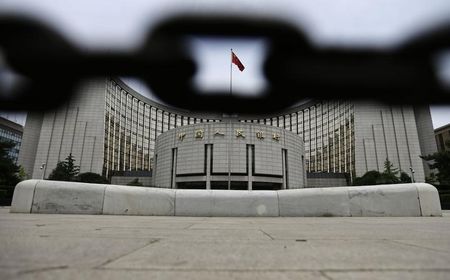By By Kevin Yao BEIJING (Reuters) - China's leadership and central bank are ready to cut interest rates again and also loosen lending restrictions, concerned that falling prices could trigger a surge in debt defaults, business failures and job losses, said sources involved in policy-making.
Friday's surprise cut in rates, the first in more than two years, reflects a change of course by Beijing and the central bank, which had persisted with modest stimulus measures before finally deciding last week that a bold monetary policy step was required to stabilize the world's second-largest economy.
Economic growth has slowed to 7.3 percent in the third quarter and policymakers feared it was on the verge of dipping below 7 percent - a rate not seen since the global financial crisis. Producer prices, charged at the factory gate, have been falling for almost three years, piling pressure on manufacturers, and consumer inflation is also weak.
"Top leaders have changed their views," said a senior economist at a government think-tank involved in internal policy discussions.
The economist, who declined to be named, said the People's Bank of China had shifted its focus toward broad-based stimulus and were open to more rate cuts as well as a cut to the banking industry's reserve requirement ratio (RRR), which effectively restricts the amount of capital available to fund loans.
China cut the RRR for some banks this year but has not announced a banking-wide reduction in the ratio since May 2012.
"Further interest rate cuts should be in the pipeline as we have entered into a rate-cut cycle and RRR cuts are also likely," the think-tank's economist said.
Friday's move, which cut one-year benchmark lending rates by 40 basis points to 5.6 percent, also arose from concerns that local governments are struggling to manage high debt burdens amidst reforms to their funding arrangements, the sources said.
Top leaders had been resisting a rate cut, fearing it could fuel debt and property bubbles and dent their reformist credentials, but were eventually swayed by signs of deteriorating growth as the property sector cooled.
Until then, they had persisted with targeted policy steps, such as cuts in reserve ratios for selected banks and liquidity injections into the banking system. But these failed to bring down borrowing costs for the corporate sector.
"Increasing liquidity by the central bank has failed to lower borrowing costs for the real economy," said a former central bank researcher who now works for the government.
"Employment still holds up, but corporate profits have been squeezed as producer price deflation bites, and it's unreasonable for banks to have hefty profits."
CALLS FOR BOLDER ACTION
Many Chinese economists had been calling for bolder policy actions, as recent data showed the economy losing more steam in the fourth quarter and consumer price inflation falling. Full-year growth is on track to undershoot the government's 7.5 percent target and mark the weakest expansion in 24 years.
"GDP growth is near 7 percent which is at a dangerous level given it could still go even lower due to structural reforms," said Li Xunlei, chief economist at Haitong Securities.
"The rate cut helped boost confidence in next year's growth outlook," said Li, who was among economists who discussed policy issues with Premier Li Keqiang at a recent cabinet session.
Government think-tanks, which make policy proposals, have urged Beijing to cut its economic growth target next year, probably to around 7 percent, from around 7.5 percent this year.
The leadership is due to map out economic and reform plans for 2015 at a work conference next month, including economic targets which will be unveiled in parliament next March.
WORRIES OVER EMPLOYMENT
China's leaders also worried that a sharp economic slowdown could hurt employment and undermine public support for reforms.
"Employment still holds up now, but it will definitely be affected if growth slows further," said Yin Zhongli, senior economist at the Chinese Academy of Social Sciences, a top government think-tank.
The central bank does not have the final word on adjusting interest rates or the value of the yuan. The basic course of monetary and currency policy is set by the State Council, China's cabinet, or by the Communist Party's ruling Politburo.
Beijing wants to push some painful reforms next year, including fiscal reforms to deal with a mountain of local government debt, and the risk of pushing local governments into defaults could be offset by lower interest rates.
Some policy insiders said the rate cut was also influenced by talks at this month's summit of the G20 group of nations, which pledged to boost flagging global growth.
China, which will host the G20 summit in 2016, is keen to maintain its influence as a major driver of global growth.

"China is keen to play a bigger role within G20 and it needs to maintain relatively fast economic growth," said Zhao Xijun, an influential economist at Renmin University.
(Editing by Mark Bendeich)